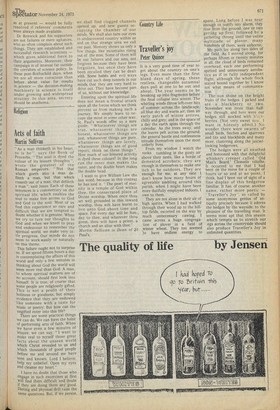Acts of faith
Martin Sullivan
"As a man thinketh in his heart, so is he ", says the Book of Proverbs. "The soul is dyed the colour of its leisure thoughts wrote the greatest of the Roman emperors. "Not that which goeth into a man defileth a man, but that which cometh out of a man. that defileth a man ", said Jesus. Each of these sentences is a commentary on the spiritual life, which enables the soul to make free access to God and God to the soul. Most of us find this experience so rare and difficult that we are tempted to doubt whether it is genuine, When we try to turn our thoughts to God and when we kneel to pray and endeavour to remember the Spiritual world, we make very little progress. Our minds do not seem to work 'easily or naturally on this theme.
This failure ought not to surprise Us. If we spend fifteen hours a day in contemplating the affairs of this world and only a few minutes in thinking about God the world will seem more real than God. A man, to whom spiritual matters are of no account, should first look into himself. It is true, of course that some people are religiously gifted. This is not a profit of their holiness or goodness, but simply evidence that they are endowed like someone with a taste for music or poetry. But how can the ungifted enter into this life?
There are some practical things we can do. We can form the habit of performing acts of faith. When we have even a few minutes of leisure, we can say, " I want to make real to myself those great facts about the unseen world Which Christ revealed to us and Which thousands of good people before me and around me have seen and known. Lord I believe; help my unbelief. Open my eyes and cleanse my heart."
I have no doubt that those who engage in such excercises at first Will find them difficult and doubt if they are doing them any good. Dieting and physical drill raise the same questions. But. if we persist, we shall find clogged channels opened up, and new guests occupying the chamber of our minds. We shall also turn our eyes to undiscovered country within us and on that strange area we call our past. Memory shows us only a few things, like mountains rising out of the mist. Some of them will be our failures and our sins, not forgiven because they have been forgotten, but once they have been recalled they can be dealt with. Some habits and evil ways have cut such deep tunnels in our minds that they are very hard to drive out. They have become part of us, without our knowledge.
Entering upon the spiritual life does not mean a frontal attack upon all the forces which we think prevent us from making such a journey. We simply learn to occupy the mind in some other way. St. Paul's words offer us a sure guide. "Whatsoever things are true, whatsoever things are honest, whatsoever things are just, whatsoever things are pure, whatsoever things are lovely, whatsoever things are of good report; think on these things ". How much of our leisured activity is dyed these colours? In the long run the inner man makes the outer, and the double heart makes the double head.
I want to give William Law the last word, because in this context he has said it. "The pearl of eternity is a temple of God within thee, the consecrated place of Divine worship. When once thou art well grounded in this inward worship, thou wilt have learnt to live unto God above time and space. For every day will be Sun-, day to thee; and wherever thou goest, thou wilt have a priest, a church and an altar with thee." Martin Sullivan is Dean of $t Paul's.


































 Previous page
Previous page